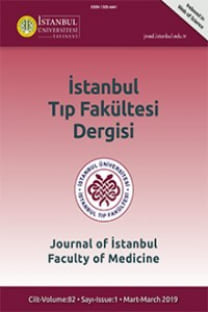Effects of postpartum depression on breastfeeding and child development
Postpartum depresyonun emzirme ve çocuk gelişimi üzerindeki etkileri
___
- 1) Aydın N, İnandı T, Yiğit A, Hodoglugil NN. Validation of the Turkish version of the Edinburg Postnatal Depression Scale among women within their first postpartum year. Soc Psychiatry Psychiatr Epidemiol 2004; 39: 483-486.
- 2) Beck C. The effects of postpartum depression on child development :a meta-analysis. Arch Psychiatr Nurs 1998;12:12-20.
- 3) Beck C, Gable R. Comparative analysis of the performance of the Postpartum Depression Screening Scale with two other depression instruments. Nursing Research 2001; 50:242- 250.
- 4) Bright DA. Postpartum mental disorders. Am Fam Physician 1994; 50: 595-598.
- 5) Bryan T, Georgiopoulos A, Harms R, Huxsahl J, Larson D, Yawn B. Incidence of postpartum depression in Olmsted Country, Minnesota: Apopulation based, retrospective study. J Reprod Med 1999;44:351-358.
- 6) Cooper P, Campbell E, Day A, Kennerley H, Bond A. Nonpsychotic psychiatric disorder after childbirth: a prospective study of prevalance, incidence, course and nature. Br J Psychiatry 1988; 152:799-806.
- 7) Cooper PJ, Murray L. Postnatal depression. BMJ 1998; 316:1884-1886.
- 8) Cox J, Holden J, Sagovsky R. Detection of Postnatal Depression- Development of the 10-item Edinburgh Postnatal Depression Scale. Br J Psychiatry 1987; 150:782-786.
- 9) Evans J, Heron J, Francomb H, Oke S, Golding J. Cohort study of depressed mood during pregnancy and after childbirth. BMJ 2001; 323:257-260.
- 10) Forman D, Videbech P, Hedegeard M, Salving J, Secher N. Postpartum depression: identification of women at risk. BJOG 2000; 107:1210-1217.
- 11) Gökçay G, Köklük S, Kayadibi F, Eraslan E, Çalışkan M. Risk factors for child development during the first two years of life. İst Medical Bull 2000;63:395-405.
- 12) İnandi T, Elçi OC, Oztürk A, Egri M, Polat A, Sahin TK. Risk factors for depression in postnatal period in eastern Turkey. Int J Epidemiol 2002; 31:1201-1207.
- 13) Murray L, Kempton C, Woolgar M, Hooper R. Depressed mother's speech to their infants and its relation to infant gender and cognitive development. J Child Psychol Psychiatry 1993; 34:1083-1101.
- 14) Murray L, Cooper PJ. Effects of postnatal depression on infant development Arch Dis Child 1997; 77:99-101.
- 15) Patel V, DeSouza N, Rodrigues M. Postnatal depression and infant growth and development in low income countries: Acohort study from Goa India. Arch Dis Child 2003; 88:34-37.
- 16) Patel V, Rahman A, Jacob KS, Hughes M. Effect of maternal mental health on infant growth:a case-control study from Rawalpindi, Pakistan. Child: Care, Health, Dev 2004; 30: 21-27.
- 17) Rahman A, Harrington R, Bunn J. Can maternal depression increase infant risk of illness and growth impairment in developing countries? Child: Care, Health Dev 2002; 28:51-56.
- 18) Rahman A, Lovel H, Bunn J, Iqbal Z, Harrington R. Mother's mental health and infant growth: a case-control study from Rawalpindi, Pakistan. Child: Care, Health Dev 2004; 30:21-27.
- Yayın Aralığı: 4
- Başlangıç: 1916
- Yayıncı: İstanbul Üniversitesi Yayınevi
Grelinin yapısı ve organizmadaki fonksiyonları
Spontaneous intracranial hypotension
Hulki FORTA, Münevver ÇELİK, Burcu İSMİHANOĞLU, Dilek NECİOĞLU, Gülay KENANGİL
The effect ofwalking and step aerobic exercise on physical fitness parameters in obese women
Nadiye BALOTA, Ahmet Bilge SÖZEN, Özen GÜVEN, Hülya AKDUR, Zerrin YİĞİT
Effects of postpartum depression on breastfeeding and child development
Yusuf SAHİP, Ahmet UÇAR, Serpil Uğur BAYSAL, Ayşegül SALGIN, Aslı POLAT, Gülbin GÖKÇAY, Emine ERASLAN, Başak YÜCEL
GRELİNİN YAPISI ve ORGANİZMADAKİ FONKSİYONLARI
POSTPARTUM DEPRESYONUN EMZİRME VE ÇOCUK GELİŞİMİ ÜZERİNDEKİ ETKİLERİ
Gülbin GÖKÇAY, Başak YÜCEL, Aslı POLAT, Serpil Uğur BAYSAL, Yusuf SAHİP, Ahmet UÇAR, Emine ERASLAN, Ayşegül SALGIN, At ALL.
Alaattin YILDIZ, Meral MERT, Ayşe KUBAT ÜZÜM, Neşe ÖZBEY, Ferihan ARAL, Nilüfer ALPAY, At ALL.
Ahmet ÇETİN, Ahmet GÖRGEN, Cem DANE, Selda ÖZTÜRK, At ALL.
YÜRÜME VE STEP AEROBİK EGZERSİZLERİNİN OBEZ KADINLARIN FİZİK PARAMETRELERİ ÜZERİNE ETKİSİ
Ahmet Bilge SÖZEN, Zerrin YİĞİT, Nadiye BALOTA, Özen GÜVEN, Hülya AKDUR, At ALL.
